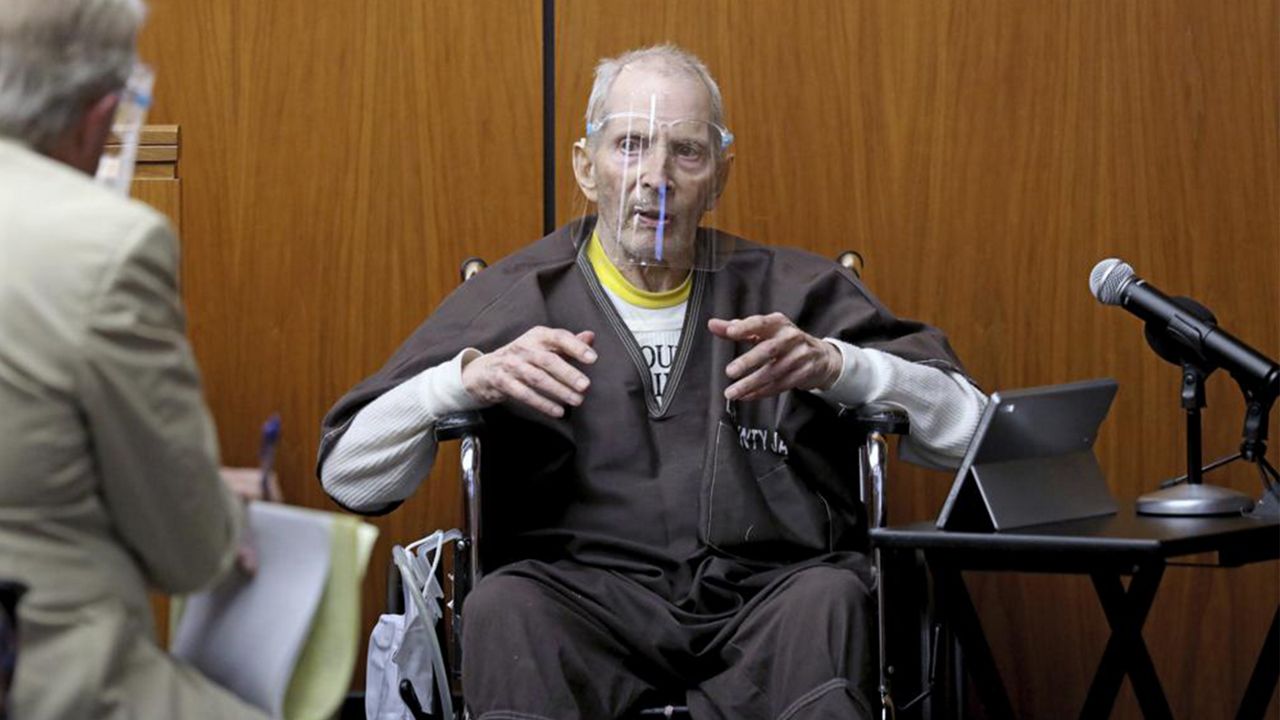LOS ANGELES (AP) — A frail-looking Robert Durst struggled to hear his attorney as he took the stand at his murder trial - in a wheelchair, not a witness chair — and denied killing his best friend two decades ago.
Durst, 78, looked extremely feeble and strained to speak Monday as his attorney, Dick DeGuerin, took the risky move of calling a murder defendant to testify.
“Bob, did you kill Susan Berman?” DeGuerin said to open the testimony of the New York real estate heir.
“No,” Durst answered.
“Do you know who did?” DeGuerin asked.
“No, I do not,” answered Durst, who was expected to return to the stand on Wednesday.
Berman acted as Durst’s de facto spokesman after the 1982 disappearance of his wife, Kathie, who was later declared dead, though no body was found.
However, prosecutors contend that Durst shot Berman in the back of the head in her Los Angeles home in 2000 because she was about to reveal to investigators his involvement in that disappearance.
Prosecutors have been allowed to present evidence that Durst killed his wife, although he has never been charged in her disappearance and has denied having anything to do with it.
Durst was arrested on a warrant in Berman’s killing in New Orleans in 2015 on the eve of the airing of the final episode of “The Jinx,” the HBO documentary series about him in which Durst made several seemingly damning statements.
The trial began in Los Angeles Superior Court more than a year ago, before the coronavirus forced a long delay.
Durst, who has bladder cancer and several other ailments that he listed from the stand, wore the brown jail attire he’s had on in court for the past few weeks of the trial. His attorneys said he’s been unable to stand to put on a suit.
He struggled to hear the clerk when he was sworn in and DeGuerin as he asked questions, using a tablet that showed a live transcription to help him understand.
Prosecutors also have been allowed to present evidence from a 2003 Texas case, where Durst testified that his Galveston neighbor Morris Black was killed in a struggle after entering his home with a gun. In that trial, Durst described chopping up and disposing of the body, and the jury found him not guilty of murder.
Durst spent much of Monday’s testimony describing the happy early years of his marriage after meeting his wife when she worked at a dentist’s office just out of high school.
“Kathie was ecstatic. I was ecstatic. We were both very much in love,” Durst said of their wedding day, his 30th birthday, in 1973, calling a light-brown suit shown in a photo “my hippie uniform.”
Eschewing the family business, he and Kathie instead opened a small general store in Vermont that sold health food and other supplies.
“You could have any kind of toothpaste you wanted, as long as it was Colgate,” Durst said.
The store, he said, was called “All Good Things.” That name was used as the title of a film based on the couple’s life, with Ryan Gosling playing Durst and Kirsten Dunst playing Kathie. Clips from the 2010 movie have been played during the trial.
Durst also described meeting Berman, a mobster’s daughter who grew up in Las Vegas, when both were in graduate school at the University of California, Los Angeles in the 1960s. He said the two struck up a close, decades-long friendship.
“We both had trust funds,” Durst said.



